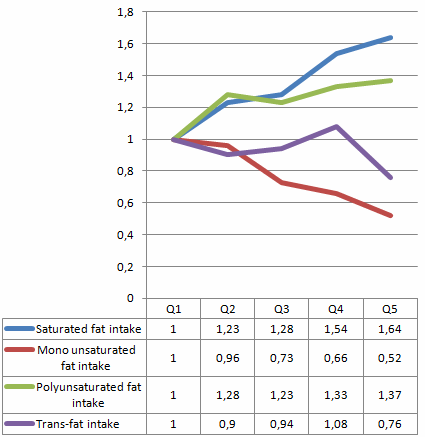|
Saturated fats in meat and dairy hasten mental decline, unsaturated fats in nuts and olive oil delay decline
If you give mice food containing large amounts of saturated fatty acids, their memory deteriorates, as we wrote some time ago. But can these results be extrapolated to humans? Epidemiologists at the University of Harvard published a study in Annals of Neurology that suggests they can. The researchers discovered that a diet containing large amounts of saturated fats speeds up the mental decline of women over 65 – and that a diet containing large amounts of monounsaturated fats slows down the rate of decline.
Study
The researchers followed over six thousand women for four years. At the start of the study the women were all over 65.
The researchers worked out the amount of saturated fatty acids [present in industrially processed foods, full-fat dairy products and fatty meat] the women ate, and the amount of monounsaturated fat [in olive oil, nuts and avocados], polyunsaturated fatty acids [in sunflower oil, corn oil and groundnut oil] and trans-fatty acids [in industrially produced foods].
Before, during and after the 4-year period the researchers tested the women's cognitive capacity, using standard tests.
Results
There was no statistically significant relationship between intake of polyunsaturated fatty acids and trans-fatty acids on the one hand and decline in mental capacity on the other. The researchers had definitely expected to find a relationship with the trans-fatty acids, but the women in the study probably ate too little trans-fatty acids for there to be a relationship.
They did observe a significant relationship with saturated and monounsaturated fatty acids. The more saturated fatty acids the women ate, the faster their mental capacity declined. Intake of monounsaturated fatty acids had the opposite effect.
The figure below shows the effect of fatty acid intake on the likelihood of dramatic decline in mental capacity. Q1 = the 20 percent of women with the lowest intake; Q5 = the 20 percent of women with the highest intake.

Mentally younger
"Estimates for 4-year cognitive change comparing women in the highest versus lowest saturated fatty acids intake quintiles were similar to those for women 5 to 6 years apart at the start of testing (i.e. 5–6 added years of aging)", the researchers write. "By contrast, mean differences in change comparing the extreme monounsaturated fatty acids intake quintiles were equivalent to 6 to 7 fewer years of aging."
Conclusion
"In conclusion, these data suggest that elevated saturated fatty acids intake is related to worse late-life cognitive trajectory, and increased monounsaturated fatty acids intake is related to better cognitive aging", the researchers conclude. "Thus, decreasing saturated fatty acids intake and increasing monounsaturated fatty acids intake merit further consideration in promoting healthy cognitive aging, and dietary patterns that incorporate higher intake of good fats (e.g. the Mediterranean diet) should be further addressed in cognitive aging research."
Source:
Ann Neurol. 2012 Jul;72(1):124-34.
More:
Less carbs, better memory 14.11.2011
How to halve your risk of Alzheimer's 03.11.2011
Anti-Alzheimer's diet is an old friend 01.11.2011
|


